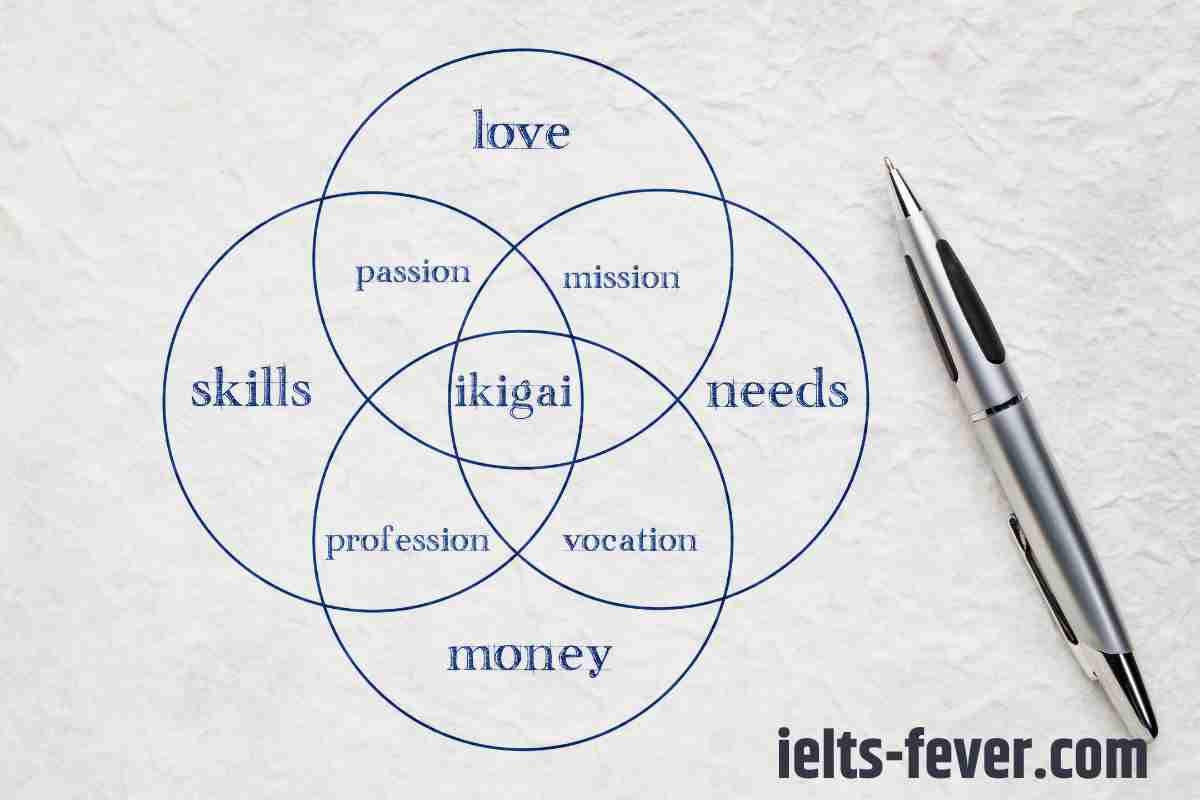Describe an interesting thing you have learned from a foreign culture. You should say:-
- What is it?
- How did you learn it?
- Why did you learn it?
- And explain how you think it will help others.
Sample 1:- Describe an interesting thing you have learned from a foreign culture.
There is an intriguing aspect that I have learned from a foreign culture, which has captivated me and left a lasting impression on my mind. The Japanese philosophy of “Ikigai” translates to “a reason for being.” Ikigai is about discovering one’s purpose in life by finding the perfect balance between passion, profession, vocation, and mission.
My journey of discovering Ikigai began when I enrolled in a cultural exchange program during my college days. It was during one of the interactive sessions with our Japanese counterparts that I got introduced to this concept. I was curious to learn more, so I did some research, read books, and even attended workshops on Ikigai. The concept was so enthralling that I could not resist diving deeper into it.
The primary motivation behind learning about Ikigai was my quest to find meaning in my life. Our world is increasingly competitive and fast-paced, making it easy for us to get lost in the rat race. Amidst all this chaos, I was searching for a sense of direction and balance. Ikigai provided me with a framework that allowed me to focus on what truly matters and prioritize my personal and professional growth.
I believe that embracing the concept of Ikigai can be immensely beneficial to others as well. Firstly, it enables individuals to gain clarity on their life’s purpose, reducing stress and cultivating happiness. Secondly, by helping people identify their unique blend of passion, skills, and values, Ikigai encourages them to pursue personally fulfilling and financially rewarding careers. Lastly, Ikigai promotes a culture of continuous learning and self-improvement, fostering personal growth and resilience.
In conclusion, the Japanese philosophy of Ikigai has profoundly impacted my life by helping me find my true purpose and achieve a harmonious balance between my personal and professional aspirations. I am confident that sharing this concept with others can bring about positive change, promoting happiness, self-actualization, and a more meaningful existence.
Sample 2:- Describe an interesting thing you have learned from a foreign culture.
One fascinating aspect I have learned from a foreign culture is the Danish concept of “Hygge,” which roughly translates to “cosiness” or “togetherness.” Hygge is about creating a warm and inviting atmosphere, enjoying life’s simple pleasures, and spending quality time with loved ones.
I was first introduced to the idea of Hygge during a study abroad program in Denmark. My Danish host family warmly embraced me and shared their way of life, which revolved around this concept. I was immediately drawn to it and started to incorporate Hygge into my daily routine. I delved deeper into its principles by reading books, watching documentaries, and engaging in conversations with the locals.
My curiosity and subsequent adoption of Hygge stemmed from my desire to find ways to live a more balanced and fulfilling life. In today’s fast-paced, technology-driven world, it is easy to feel overwhelmed and disconnected from the people and things that truly matter. Hygge offered me a fresh perspective and a means to slow down, appreciate the present moment, and cultivate a greater sense of well-being.
I am convinced that the practice of Hygge can positively impact others as well. Firstly, it encourages people to prioritize their emotional well-being, which can reduce stress, improve mental health, and increase overall happiness. Secondly, Hygge fosters a sense of belonging and connection with others, strengthening social bonds and enhancing one’s support network. Finally, by promoting a focus on life’s simple pleasures, Hygge helps individuals develop a greater appreciation for the world around them and live more mindfully.
In summary, the Danish concept of Hygge has taught me the importance of cultivating warmth, connection, and simplicity in my life. By embracing and sharing this practice, I believe others can also experience the positive impact of Hygge, leading to more contentment, emotional well-being, and a stronger sense of community.
Follow-Up Questions:- Describe an interesting thing you have learned from a foreign culture.
Question 1:- How do you learn about celebrations that are related to your culture?
Answer – I have learned about celebrations related to Japanese culture through various means. I have taken courses and attended workshops where I have been introduced to the customs and traditions of Japanese culture. Moreover, I have read books, watched documentaries, and researched online to gain more knowledge about Japan and its diverse cultural practices. Additionally, I have interacted with people from Japan, listened to their stories, and learned about their cultural practices and values. Overall, I have tried to immerse myself in Japan’s rich and fascinating culture to gain a deeper understanding of its celebrations and traditions.
Question 2:- What do you think are common celebrations all over the world?
Answer – There are several celebrations that are commonly celebrated all over the world, regardless of the culture or region. Some of these celebrations include New Year’s Day, Christmas, Easter, and Valentine’s Day. Other widely celebrated celebrations include weddings, birthdays, graduations, and religious festivals. These celebrations often involve traditional customs and rituals that are unique to each culture, but they share common themes such as family, community, and joyous occasions. Overall, these celebrations reflect the universal human desire to commemorate important events and milestones in our lives.
Question 3:- Do you think we should follow our culture and traditions, and why?
Answer – I believe that following Japanese culture and traditions can be a positive aspect of personal and societal identity. Embracing cultural heritage can help preserve traditions, values, and customs that have been passed down for generations. Additionally, following Japanese culture and traditions can provide a sense of community and belonging, which can contribute to a deeper appreciation of one’s cultural identity. However, it is also essential to recognize that cultures are not static and can change over time. Therefore, it is crucial to strike a balance between preserving cultural heritage and adapting to changing circumstances to ensure cultural relevancy and vitality.
Question 4:- How do you react to spending a lot of money on celebrations?
Answer – I believe that spending a lot of money on celebrations can be justified depending on the importance of the event and personal financial circumstances. While it is essential to celebrate important events, it is equally important to consider the financial implications of spending a significant amount of money on them. Overspending on celebrations can lead to financial stress and hardship, which can have long-lasting consequences. Therefore, it is important to strike a balance between celebrating important events and being financially responsible. Celebrations can be creative and cost-effective while still being meaningful and enjoyable.
Follow us on Facebook

